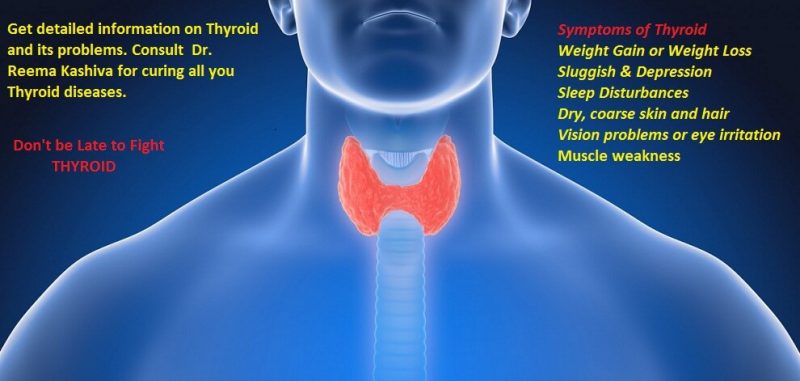Thyroid Treatment in Pune
Thyroid Management With Diabetes
What are Thyroid disorders?
Thyroid disorders are conditions that affect the thyroid gland, a butterfly-shaped gland in the front of the neck. The thyroid has important roles to regulate numerous metabolic processes throughout the body. Different types of thyroid disorders affect either its structure or function.Dr.Reema Kashiva Provides one of the best services for Thyroid Treatment in Pune.

Dr. Reema Kashiva is a leading Senior Diabetes & Bariatric (Obesity) and Thyroid Specialist in the country and gives treatment for Thyroid in Pune. She completed her M.B.B.S from Gandhi Medical College, Bhopal and M.D. (General Medicine) from Gandhi Memorial Medical Hospital, Indore.
The thyroid gland is located below Adam’s apple wrapped around the trachea (windpipe). A thin area of tissue in the gland’s middle, known as the isthmus, joins the two thyroid lobes on each side. The thyroid uses iodine to produce vital hormones. Thyroxine, also known as T4, is the primary hormone produced by the gland. After delivery via the bloodstream to the body’s tissues, a small portion of the T4 released from the gland is converted to triiodothyronine (T3), which is the most active hormone.
The function of the thyroid gland is regulated by a feedback mechanism involving the brain. When thyroid hormone levels are low, the hypothalamus in the brain produces a hormone known as thyrotropin releasing hormone (TRH) that causes the pituitary gland (located at the base of the brain) to release thyroid stimulating hormone (TSH). TSH stimulates the thyroid gland to release more T4.
Since the thyroid gland is controlled by the pituitary gland and hypothalamus, disorders of these tissues can also affect thyroid function and cause thyroid problems.
How do thyroid problems affect women?
Women are more likely than men to have thyroid disease. One in eight women will develop thyroid problems during her lifetime.1 In women, thyroid diseases can cause:
Sometimes, symptoms of thyroid problems are mistaken for menopause symptoms. Thyroid disease, especially hypothyroidism, is more likely to develop after menopause.
